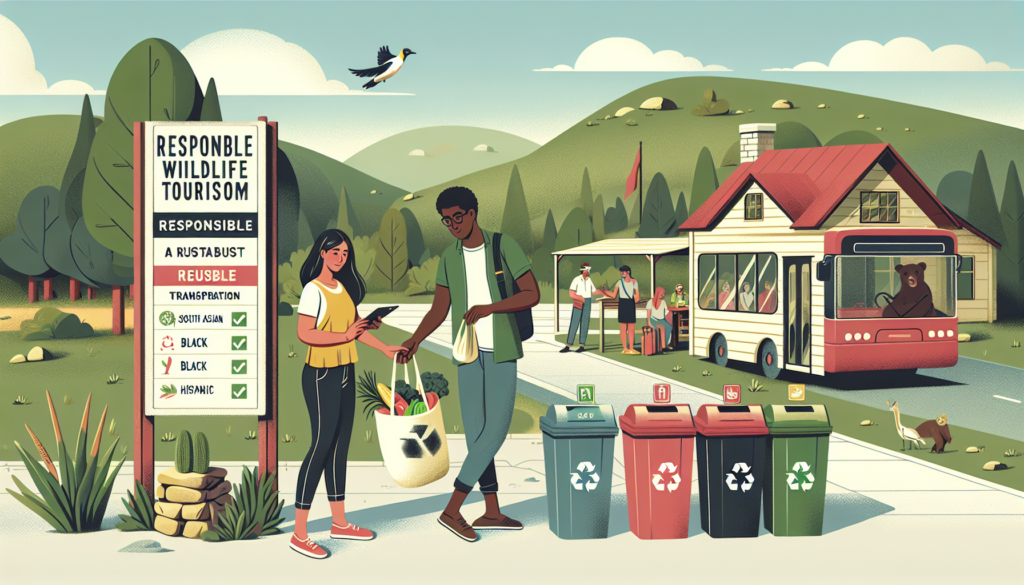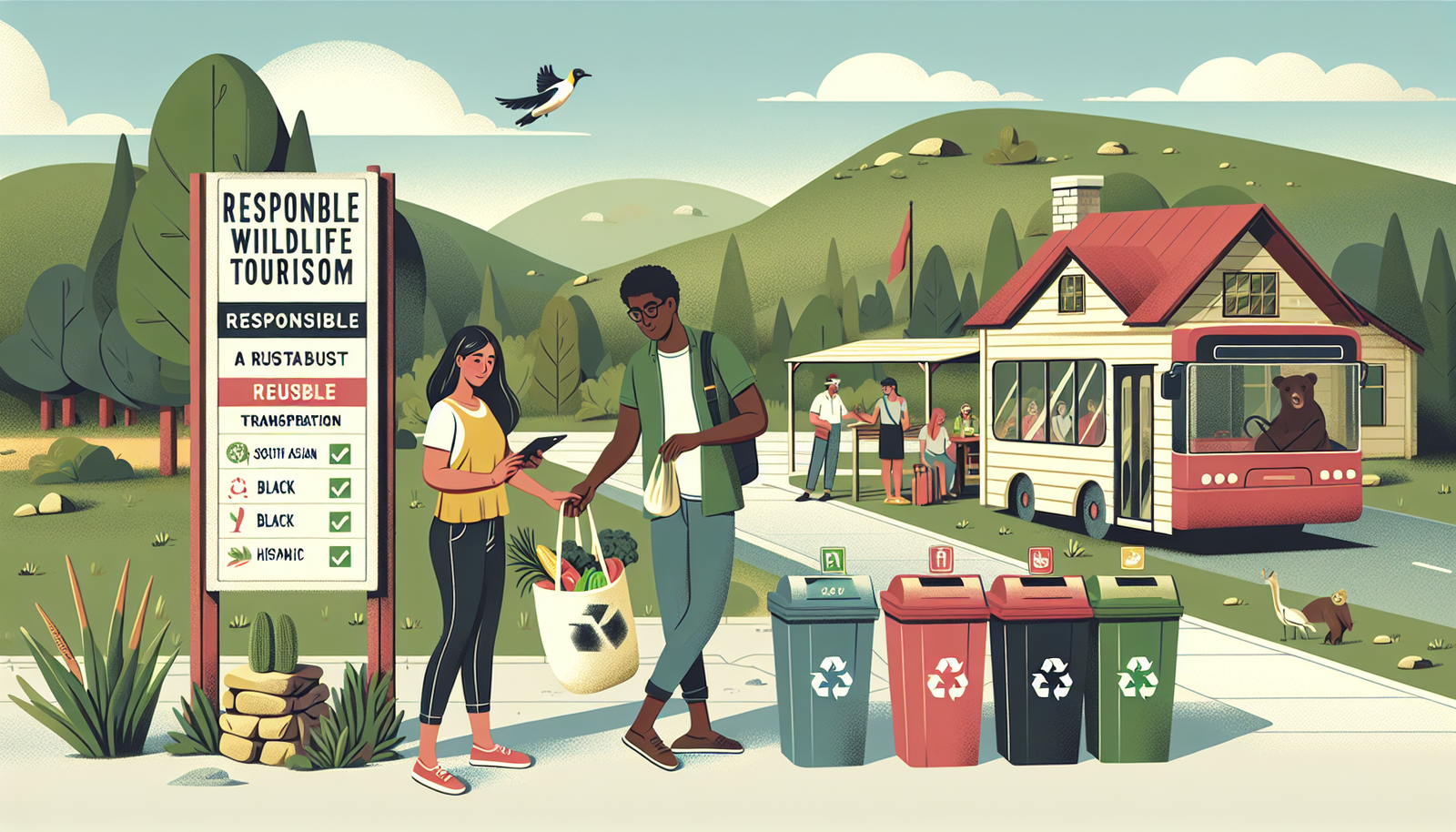Are you ready to embark on a vacation that not only promises unforgettable memories but also contributes positively to the environment? In this article, we will guide you through the process of planning an eco-friendly vacation. From choosing sustainable accommodations to supporting local communities, we will share tips and ideas that will help you make a positive impact on the planet while enjoying your well-deserved getaway. So, grab your notebook and get ready to plan the greenest vacation of your dreams!

Choosing an Eco-Friendly Destination
When it comes to planning an eco-friendly vacation, it all starts with choosing the right destination. Researching eco-friendly destinations is the first step to ensuring that your travel plans align with your values. Look for destinations that prioritize sustainable practices, conservation efforts, and promote responsible tourism. This could include national parks, wildlife reserves, or areas with a strong focus on eco-tourism. By selecting an eco-friendly destination, you can rest assured that your trip will have a positive impact on the environment.
A. Researching eco-friendly destinations
Start your research by looking into destinations that prioritize sustainability and promote conservation efforts. Look for places that have implemented initiatives to protect the environment, preserve natural resources, and support local communities. Consider factors such as the presence of national parks, protected areas, and wildlife sanctuaries. Also, look for destinations that have a strong commitment to eco-tourism. These places often have eco-certifications or partnerships with conservation organizations, demonstrating their dedication to sustainable practices.
B. Considering local conservation efforts
While researching eco-friendly destinations, it’s important to consider the local conservation efforts in place. Look for destinations that actively work towards protecting their natural resources and wildlife. This could include initiatives such as reforestation programs, marine conservation projects, or efforts to protect endangered species. By choosing a destination that actively supports conservation, you can contribute to these efforts and make a positive impact on the environment.
C. Supporting eco-friendly accommodations
In addition to choosing an eco-friendly destination, it’s crucial to consider the accommodations you will be staying in during your vacation. Look for hotels, resorts, or lodges that have implemented sustainable practices. This could include measures such as energy-efficient systems, water conservation programs, waste management initiatives, and the use of renewable energy sources. By supporting eco-friendly accommodations, you can contribute to reducing your carbon footprint and promote environmentally responsible practices in the tourism industry.
Evaluating Transportation Options
Transportation is a significant contributor to carbon emissions, so it’s important to evaluate your transportation options carefully when planning an eco-friendly vacation. Opting for sustainable transportation methods can greatly reduce the environmental impact of your travels and even make your journey more enjoyable.
A. Opting for sustainable transportation
Consider alternative modes of transportation that are more sustainable than cars or planes. For shorter distances, consider cycling, walking, or using electric scooters. These options not only reduce carbon emissions but also allow you to explore your destination at a slower pace and immerse yourself in the surroundings. If the distance is too long for non-motorized options, consider taking a train or a bus, as they are generally more fuel-efficient than flying or driving a car alone.
B. Reducing air travel emissions
Air travel is notorious for its high carbon emissions, so if possible, try to reduce the number of flights you take. Consider combining multiple destinations into one trip to minimize the number of flights needed. Furthermore, consider flying non-stop whenever possible, as take-off and landing generate the most emissions. If you have the time, consider exploring closer-to-home destinations that can be reached by alternative means of transportation, such as a train or a bus.
C. Utilizing public transportation when possible
Once you arrive at your destination, make use of public transportation whenever possible. Trains, buses, and trams are often more sustainable options compared to renting a car or taking taxis. Not only will you reduce your carbon footprint, but you will also have the opportunity to interact with the locals and experience the destination from a different perspective. Public transportation can also be a more affordable option, allowing you to save money while being environmentally conscious.
Sustainable Accommodation Choices
Choosing the right accommodation plays a significant role in ensuring your vacation is eco-friendly. Look for accommodations that prioritize sustainability and implement practices that minimize their environmental impact. By staying at eco-friendly accommodations, you can support businesses that prioritize the well-being of the planet and contribute to a more sustainable travel industry.
A. Researching eco-friendly accommodations
Before making a reservation, take the time to research and find accommodations that have sustainability at the core of their operations. Look for certifications or eco-labels that indicate the accommodation meets specific environmental criteria. These certifications could include LEED certification, Green Key certification, or eco-labels specific to the region. Additionally, read reviews from other travelers to get an idea of how environmentally conscious the accommodation is. By conducting thorough research, you can make an informed decision and choose an eco-friendly place to stay.
B. Choosing hotels with sustainable practices
When researching accommodations, pay attention to the sustainable practices implemented by hotels. Look for properties that prioritize energy conservation, waste management, and water efficiency. This could include measures such as energy-efficient lighting, low-flow showerheads and toilets, recycling programs, and the use of organic and locally sourced food. Some hotels even have rooftop gardens or offer bicycle rentals to encourage sustainable transportation. By staying at hotels with sustainable practices, you can minimize your environmental impact while enjoying a comfortable stay.
C. Opting for eco-lodges or homestays
Consider staying at eco-lodges or homestays for a more sustainable accommodation option. These establishments are often located in natural surroundings and are designed to have minimal impact on the environment. Many eco-lodges use renewable energy sources, practice water conservation, and support local communities. Homestays allow you to connect with local families, experience their way of life, and contribute directly to the local economy. By choosing eco-lodges or homestays, you can have a unique and sustainable experience while supporting businesses that prioritize the environment and local communities.
D. Considering camping or glamping options
For those who enjoy outdoor adventures, camping or glamping can be a great eco-friendly accommodation choice. Camping allows you to immerse yourself in nature while minimizing your environmental impact. Look for campsites that have designated areas for tents, provide recycling facilities, and implement measures to protect the surrounding ecosystem. Glamping offers a more luxurious camping experience with added amenities, but with a focus on sustainability and eco-friendly practices. By enjoying the outdoors and choosing camping or glamping options, you can minimize your environmental footprint and appreciate the beauty of nature.
Responsible Sightseeing and Activities
When exploring a new destination, it’s important to engage in responsible sightseeing and activities that prioritize the well-being of the environment, wildlife, and local communities. By supporting eco-tourism initiatives and participating in activities that are wildlife-friendly and community-based, you can have a memorable vacation while minimizing your impact on the destination.
A. Supporting local eco-tourism initiatives
Research and support local eco-tourism initiatives that focus on sustainable practices and conservation efforts. This could include joining guided tours led by trained naturalists or participating in community-led initiatives aimed at protecting the local environment. By supporting eco-tourism initiatives, your tourist dollars directly contribute to the preservation of natural resources and support the local economy.
B. Engaging in wildlife-friendly activities
When it comes to wildlife-related activities, choose options that prioritize animal welfare and conservation. Avoid activities that involve captive animals, such as elephant riding or posing with sedated tigers. Instead, opt for responsible wildlife experiences, such as observing animals in their natural habitats with trained guides. Supporting sanctuaries and rehabilitation centers also allows you to learn about the importance of wildlife conservation while contributing to their efforts.
C. Participating in community-based tourism
Consider participating in community-based tourism initiatives that allow you to engage with local communities and learn about their traditions and way of life. This could include visiting local villages, participating in traditional craft workshops, or supporting community-run homestays. By engaging in community-based tourism, you contribute to the preservation of cultural heritage and directly support the local economy.
Minimizing Waste and Plastic Usage
One of the easiest ways to make your vacation more eco-friendly is by minimizing waste and reducing the use of single-use plastics. By packing eco-friendly essentials, using reusable water bottles and utensils, avoiding single-use plastics, and properly disposing of waste, you can significantly reduce your environmental footprint.
A. Packing eco-friendly essentials
Before embarking on your eco-friendly vacation, make sure to pack essential items that promote sustainability. Bring reusable shopping bags, cloth napkins, and eco-friendly toiletries such as biodegradable soap and shampoo. Consider bringing a reusable shopping bag for groceries, a reusable mug or bottle for beverages, and a reusable utensil set to avoid single-use cutlery. By packing these eco-friendly essentials, you can significantly reduce your consumption of single-use items during your trip.
B. Using reusable water bottles and utensils
One of the easiest ways to reduce single-use plastic waste is by bringing a reusable water bottle and utensils. Refill your water bottle at water stations or tap water sources, rather than purchasing plastic bottles. This not only reduces plastic waste but also saves you money. Similarly, carry a reusable utensil set so you can avoid using disposable plastic cutlery when eating on the go. By using reusable water bottles and utensils, you actively contribute to reducing the demand for single-use plastics and promote a more sustainable travel experience.
C. Avoiding single-use plastics
Make a conscious effort to avoid single-use plastics during your vacation. Refuse plastic straws, stirrers, and take-out containers whenever possible, and bring your own reusable alternatives. Consider purchasing a collapsible travel straw or a reusable silicone food container to bring with you. Many destinations now have refill stations or water filters available, making it easier to avoid purchasing plastic water bottles. By refusing single-use plastics, you can help to reduce plastic pollution and protect our oceans and natural habitats.
D. Properly disposing waste
Dispose of your waste responsibly throughout your trip. Be sure to separate recyclable items from general waste and dispose of them in designated recycling bins. If recycling facilities are not available, carry the recyclables with you until you can find an appropriate place to dispose of them. Additionally, be mindful of your surroundings when disposing of waste while enjoying outdoor activities. Properly following waste disposal guidelines helps to keep the destination clean and protect the environment.

Conserving Energy and Resources
Conserving energy and minimizing resource consumption are essential aspects of eco-friendly travel. By practicing energy and water conservation and minimizing overall resource consumption, you can significantly reduce your impact on the environment while enjoying your vacation.
A. Conserving energy in accommodations
When staying in accommodations, make an effort to conserve energy by turning off lights, electronics, and air conditioning when not in use. Unplug chargers and electronic devices when they are fully charged to avoid vampire energy consumption. Additionally, use natural light whenever possible and adjust the thermostat to moderate temperatures. By practicing energy conservation in accommodations, you can contribute to reducing greenhouse gas emissions and promote sustainable practices.
B. Practicing water conservation
Water is a precious resource, especially in many travel destinations. Be mindful of your water usage and practice water conservation wherever you go. Take shorter showers, turn off taps when brushing your teeth or washing dishes, and report any leaks or water waste to the appropriate authorities. Reuse towels and linens when possible, as many eco-friendly accommodations have implemented programs to conserve water. By adopting water conservation practices, you can help protect this valuable resource and support sustainable water management.
C. Minimizing resource consumption
Be mindful of your overall resource consumption during your eco-friendly vacation. Minimize waste by only taking what you need and avoiding excess packaging. When shopping for souvenirs, choose sustainable and locally made products, rather than mass-produced items. Conserve resources such as paper and electricity by opting for digital maps, travel guides, and electronic tickets whenever possible. By being conscious of your resource consumption, you can contribute to a more sustainable and responsible travel experience.
Supporting Local Communities and Businesses
Supporting local communities and businesses is not only beneficial for the economy, but it also promotes sustainable tourism and fosters cultural exchange. By choosing local tour operators and guides, purchasing locally-made souvenirs, eating at local restaurants, and contributing to community development, you can have a meaningful and impactful vacation.
A. Choosing local tour operators and guides
When booking tours or activities, opt for local tour operators and guides. These individuals and companies have in-depth knowledge of the destination and can provide a more authentic and culturally immersive experience. Supporting local tour operators helps to create jobs and income for the local community, allowing them to benefit directly from tourism. By choosing local tour operators and guides, you contribute to sustainable tourism and support the preservation of local culture and heritage.
B. Purchasing locally-made souvenirs
When shopping for souvenirs, make an effort to purchase locally-made products. These items often showcase the craftsmanship and culture of the destination, and your purchase helps to support local artisans and small businesses. Look for handmade crafts, textiles, or traditional artwork that reflect the local culture. By purchasing locally-made souvenirs, you contribute to the preservation of cultural heritage and support sustainable economic development within the community.
C. Eating at local restaurants
Explore the local culinary scene and opt for local restaurants and eateries during your eco-friendly vacation. By choosing to dine at locally-owned establishments, you support the local economy and the livelihoods of the people who live there. Local cuisine often incorporates traditional and locally sourced ingredients, providing a more authentic dining experience. Additionally, seeking out restaurants that prioritize sustainable practices, such as sourcing locally grown produce or following zero-waste principles, can further enhance your eco-friendly travel experience.
D. Contributing to community development
Consider contributing to community development initiatives during your eco-friendly vacation. Research and support local projects that focus on education, health, or environmental conservation. This could include volunteering at local schools, supporting health clinics, or participating in beach clean-up programs. By actively engaging in community development, you can leave a positive and lasting impact on the destination while learning about the local challenges and contributing to their solutions.
Offsetting Carbon Footprint
While it’s essential to minimize your carbon footprint during your eco-friendly vacation, it’s also valuable to offset the emissions that you cannot entirely avoid. Carbon offset projects allow individuals to invest in initiatives that reduce greenhouse gas emissions or absorb CO2 from the atmosphere. By calculating your carbon emissions and supporting carbon offset projects, you can take responsibility for your remaining impact on the environment.
A. Calculating and reducing carbon emissions
Calculate your carbon emissions from transportation, accommodation, and other activities using online carbon calculators. This will give you a better understanding of the carbon footprint of your vacation. Once you have determined your emissions, look for ways to reduce them. This could include choosing alternative transportation methods or opting for accommodations with low carbon footprints. By actively reducing your carbon emissions, you lessen your impact on the environment.
B. Supporting carbon offset projects
To offset the remaining carbon emissions from your eco-friendly vacation, consider supporting carbon offset projects. These projects can include initiatives such as reforestation, renewable energy development, or energy efficiency programs. Look for reputable organizations that offer certified carbon offsets and invest in projects that have a measurable and positive environmental impact. By supporting carbon offset projects, you can balance out your carbon emissions and contribute to global efforts to combat climate change.
Educating Yourself and Others
Understanding local environmental issues and spreading awareness about eco-friendly travel are essential aspects of being a responsible traveler. By learning about the challenges faced by different destinations and sharing this knowledge with others, you can inspire more people to make sustainable choices and support environmentally-friendly tourism.
A. Learning about local environmental issues
Take the time to educate yourself about the environmental challenges faced by the destination you are visiting. This could include researching issues such as deforestation, water scarcity, or habitat destruction. Learn about local conservation efforts and the organizations working towards sustainability. By understanding the local environmental issues, you can have a deeper appreciation for the destination and make more informed decisions as a traveler.
B. Spreading awareness about eco-friendly travel
Share your knowledge and experiences about eco-friendly travel with others. Whether through social media, blog posts, or simply talking to friends and family, spread awareness about sustainable practices and the positive impact of responsible tourism. Encourage others to make conscious choices while traveling and highlight the benefits of supporting local communities and the environment. By spreading awareness, you can inspire more people to travel responsibly and contribute to a more sustainable future.
Conclusion
Planning an eco-friendly vacation involves making conscious choices at every step of the way, from selecting an eco-friendly destination to offsetting your carbon footprint. By researching eco-friendly destinations, opting for sustainable transportation, choosing eco-friendly accommodations, engaging in responsible sightseeing and activities, minimizing waste and plastic usage, conserving energy and resources, supporting local communities and businesses, offsetting your carbon footprint, educating yourself and others, you can have a truly eco-friendly and meaningful travel experience. Remember, the choices you make as a traveler can make a positive impact on the environment and local communities, ensuring that future generations can continue to enjoy the wonders of our planet in the years to come.

